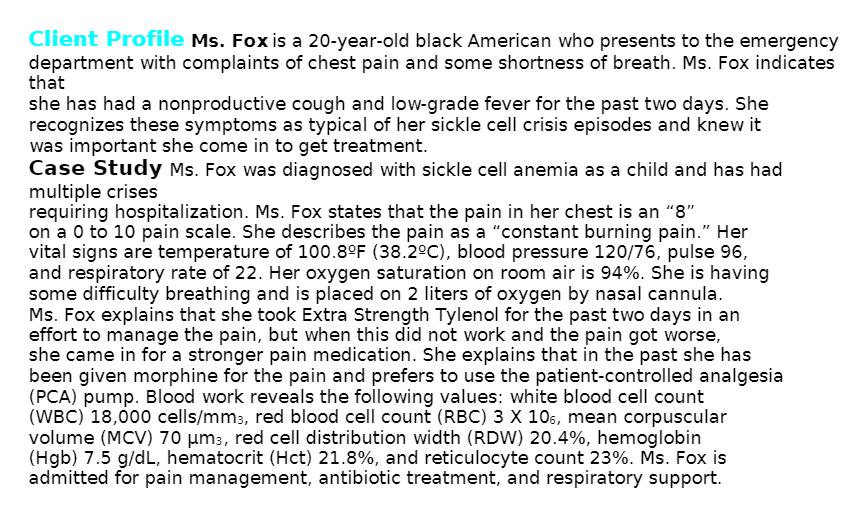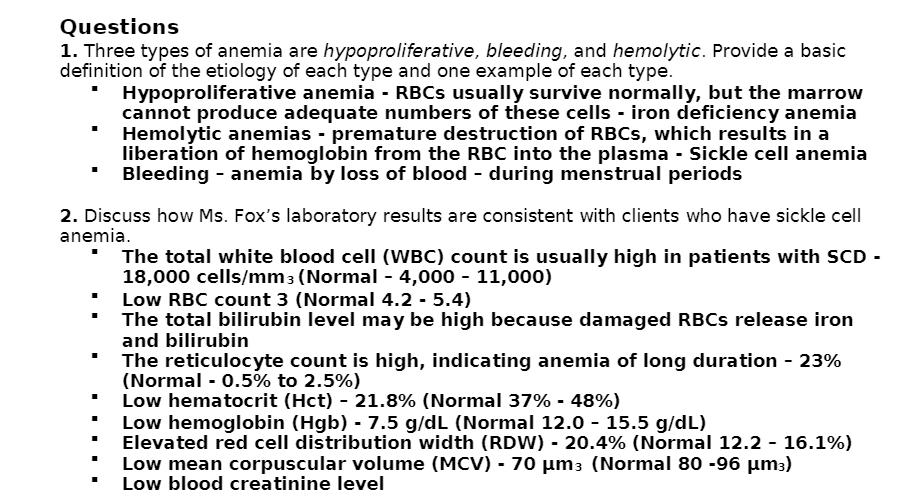Question: n Client Profile Ms. Fox is a 20-year-old black American who presents to the emergency department with complaints of chest pain and some shortness of

 n
n
Client Profile Ms. Fox is a 20-year-old black American who presents to the emergency department with complaints of chest pain and some shortness of breath. Ms. Fox indicates that she has had a nonproductive cough and low-grade fever for the past two days. She recognizes these symptoms as typical of her sickle cell crisis episodes and knew it was important she come in to get treatment. Case Study Ms. Fox was diagnosed with sickle cell anemia as a child and has had multiple crises requiring hospitalization. Ms. Fox states that the pain in her chest is an "8" on a 0 to 10 pain scale. She describes the pain as a "constant burning pain." Her vital signs are temperature of 100.8F (38.2C), blood pressure 120/76, pulse 96, and respiratory rate of 22. Her oxygen saturation on room air is 94%. She is having some difficulty breathing and is placed on 2 liters of oxygen by nasal cannula. Ms. Fox explains that she took Extra Strength Tylenol for the past two days in an effort to manage the pain, but when this did not work and the pain got worse, she came in for a stronger pain medication. She explains that in the past she has been given morphine for the pain and prefers to use the patient-controlled analgesia (PCA) pump. Blood work reveals the following values: white blood cell count (WBC) 18,000 cells/mms, red blood cell count (RBC) 3 X 105, mean corpuscular volume (MCV) 70 ums, red cell distribution width (RDW) 20.4%, hemoglobin (Hgb) 7.5 g/dL, hematocrit (Hct) 21.8%, and reticulocyte count 23%. Ms. Fox is admitted for pain management, antibiotic treatment, and respiratory support. Questions 1. Three types of anemia are hypoproliferative, bleeding, and hemolytic. Provide a basic definition of the etiology of each type and one example of each type. Hypoproliferative anemia - RBCS usually survive normally, but the marrow cannot produce adequate numbers of these cells iron deficiency anemia Hemolytic anemias premature destruction of RBCS, which results in a liberation of hemoglobin from the RBC into the plasma - Sickle cell anemia Bleeding - anemia by loss of blood during menstrual periods 2. Discuss how Ms. Fox's laboratory results are consistent with clients who have sickle cell anemia. The total white blood cell (WBC) count is usually high in patients with SCD - 18,000 cells/mm3 (Normal - 4,000 - 11,000) Low RBC count 3 (Normal 4.2 - 5.4) The total bilirubin level may be high because damaged RBCS release iron and bilirubin The reticulocyte count is high, indicating anemia of long duration - 23% (Normal - 0.5% to 2.5%) Low hematocrit (Hct) - 21.8% (Normal 37% - 48%) Low hemoglobin (Hgb) - 7.5 g/dL (Normal 12.0 15.5 g/dL) Elevated red cell distribution width (RDW) - 20.4% (Normal 12.2 - 16.1%) Low mean corpuscular volume (MCV) - 70 m3 (Normal 80 -96 pm3) Low blood creatinine level
Step by Step Solution
3.32 Rating (164 Votes )
There are 3 Steps involved in it
It looks like youve uploaded an image containing questions and case study information Ill analyze the provided images and answer the questions accordi... View full answer

Get step-by-step solutions from verified subject matter experts


